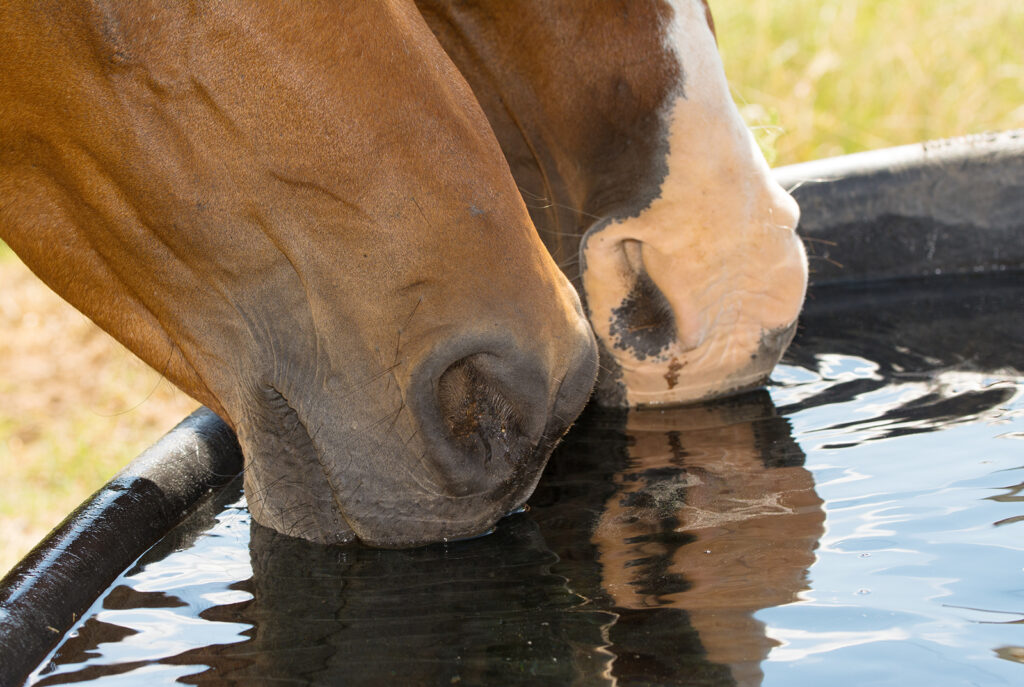Electrolytes are essential for horses, especially when they take part in intense physical activity and sporting events. Adding electrolytes to a horse’s diet can help in maintaining a healthy balance of electrolyte levels in their system. Electrolytes also help ensure that horses stay hydrated and replenish vital minerals and vitamins.
Understanding Electrolytes and Their Role in Horse Nutrition
The term “electrolytes” refers to a range of compounds found in the blood or other body fluids that have an electrical charge. They have numerous roles in the horse’s body, including regulating the balance of fluid, helping with the absorption of carbohydrates, aiding in the distribution of hormones, and controlling the acid-base balance of the body. Some of the most common electrolytes found in horses are sodium, chloride, calcium and potassium.
Electrolytes are essential for the proper functioning of the horse’s body, and the horse needs to receive the correct balance of electrolytes in its diet. If the horse is not receiving enough electrolytes, it can lead to dehydration, fatigue, and other health issues, including death. On the other hand, if the horse is receiving too many electrolytes, it can lead to electrolyte imbalances, which can cause muscle cramps, weakness, and other health issues.
Types of Electrolytes Suitable for Horse Diets
There are several types of electrolytes available for horse diets. Oral electrolytes are typically given as a powder or paste, or in special horse drinks. More importantly, electrolytes are sold as either sugar or salt based. Know which type your horse needs in order to provide the proper replenishment.
Injectable electrolytes are often given as a supplement for horses that need an immediate boost and are best administered by a veterinarian. These forms often contain a blend of minerals, including calcium, sodium chloride, potassium, magnesium, and phosphorus.
Electrolytes should not be given to horses as a substitute for water. Horses need to drink plenty of water to stay hydrated and healthy. Electrolytes should not be given to horses with certain medical conditions, such as kidney or liver disease, without consulting a veterinarian first.
The Benefits of Increasing Electrolyte Intake
Increasing electrolyte intake can provide several benefits to horses. Electrolytes allow horses to perform at their peak when involved in strenuous physical activity. As mentioned before, electrolytes help regulate the horse’s acid-base balance, helping them stay healthy and hydrated. Electrolytes aid with muscle contraction and help to create energy stores.
Electrolytes also help to maintain the horse’s body temperature, as they help to regulate the amount of water in the body. This is especially important in hot climates, as it helps to prevent dehydration. Furthermore, electrolytes can help to reduce the risk of colic, as they help to keep the horse’s digestive system functioning properly. Finally, electrolytes can help to reduce the risk of fatigue, as they help to replenish the body’s energy stores.
Understanding the Signs of Electrolyte Deficiency in Horses
If a horse is deficient in electrolytes, it may display the following symptoms: lack of energy, lack of appetite, dehydration, fatigue, and weak muscle strength. They may also be more prone to illness and have difficulty keeping up with other horses. Identify any signs of electrolyte deficiency and make sure your horse gets the right amount of electrolytes.
Electrolyte deficiency can be caused by a variety of factors, including excessive sweating, inadequate nutrition, and prolonged exercise. Monitor your horse’s electrolyte levels and adjust their diet accordingly. If your horse is showing signs of electrolyte deficiency, consult your veterinarian or equine nutritionist for advice on how to best address the issue.
Tips for Adding Electrolytes to Your Horse’s Diet
When attempting to add electrolytes to your horse’s diet, choose products suited for horse consumption. Make sure that your horse has access to clean water so that it can benefit from the electrolyte supplement. When feeding your horse their food, give them the electrolyte supplement either mixed with their feed or as a separate drink.
Monitor your horse’s electrolyte levels to ensure that they are getting the right amount. If your horse is sweating heavily, it may need more electrolytes than usual. If your horse is not drinking enough water, it may need more electrolytes to stay hydrated. If you are unsure of how much electrolytes your horse needs, consult your veterinarian for advice.
Factors to Consider When Adding Electrolytes to Your Horse’s Diet
The amount of electrolyte supplement your horse will require will depend on a variety of factors, including their age, physical activity level, and health. Consider the type of feed they are consuming and their sweat rate when adding electrolyte supplements. Too much or too little electrolytes can lead to an imbalance that can lead to health problems.
Consult with your veterinarian to determine the best electrolyte supplement for your horse. Different supplements may contain different levels of electrolytes, so be sure to read the label carefully to ensure you are providing the correct amount.
Monitor your horse’s electrolyte levels regularly to ensure they are not becoming unbalanced.
Potential Risks and Side Effects of Adding Electrolytes
Although adding electrolytes to your horse’s diet can be beneficial, be aware of potential risks and side effects. Overdosing on electrolytes can lead to severe health issues, such as dehydration and digestive issues.
Some horses may be sensitive to certain types of electrolytes and should be monitored carefully when changing their diet. Consult your veterinarian or equine nutritionist before beginning any changes to your horse’s diet.
Electrolytes should be added to your horse’s diet gradually, as sudden changes can cause digestive upset. Electrolytes should be given in moderation, as too much can lead to electrolyte imbalances. Ensure that your horse has access to plenty of fresh, clean water, as this will help to prevent dehydration.
Adding electrolytes to your horse’s diet can provide numerous benefits. Electrolytes play an important role in helping maintain balance in the horse’s body and contribute to energy stores. However, consider factors such as age, activity level, and health before introducing any electrolyte supplements. Consult your veterinarian and be aware of potential risks when making changes to your horse’s diet.
Electrolytes are essential for horses, as they help to regulate the body’s fluid balance, muscle contraction, and nerve transmission. They also help to replenish lost minerals and electrolytes due to sweating. When introducing electrolytes to your horse’s diet, ensure that the supplement is appropriate for your horse’s needs.
Different types of electrolytes are available — select the right one for your horse. Monitor your horse’s electrolyte levels to ensure that they are not too high or too low.


